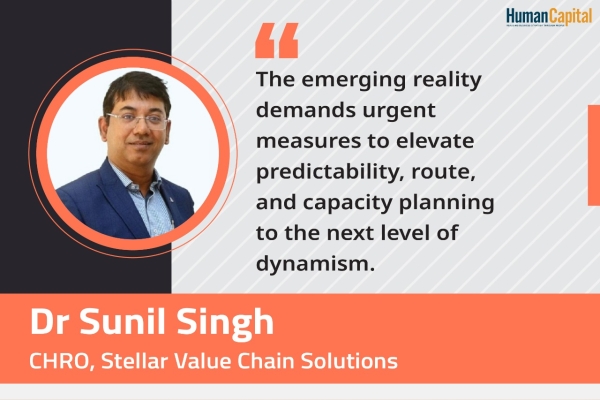Automation can take over the task of recruitment, but it is highly prone to errors. An effective solution is therefore to partner with an RPO, which can not only automate the talent acquisition process, but also infuse the human element in the process.
The biggest problem confronting organisations in India as far as recruitment is concerned is not the sourcing of potential candidates, but in fact, finding the right talent fit. Organisations, therefore, have resorted to the specialist entities that cater effective Recruitment Process Outsourcing (RPO) solutions. The main advantages of hiring such an agency are: -
● Reduced time spent on talent acquisition by up to 40%
● Increased cost savings that organisations spend on bringing right people on board
● High quality of recruitment
● Higher brand equity through better candidate engagement
And today, RPO is an impressive business in India that churns out an annual turnover of Rs. 400 Crore. For a service vertical which in India is still in its infancy, this is a reflection of the tremendous potential that the business represents. However, many organisations have not yet settled to the viability of partnering with an RPO service provider as they seek more than just the basic features in the recruitment machinery. With recruitment, Application Tracking Systems (ATS), AI based assessment tools, and a well defined recruitment process, one can get a feeling of having absolute control over talent acquisition. Things, however, are different than they appear.
Is recruitment an organisational core competency?
An organisation cannot grow, or possess a competitive advantage over its competitors without an efficient human capital. However, is recruitment the core competency of an organisation? Research indicates that HR managers spend around 40% of their time screening potential candidates manually, and updating records in the ATS. Being a monotonous task, this leaves little or mostly unproductive time for the manager to perform other tasks. An organisation is wasting precious time, resource and energy on a task that can be effectively managed by an external expert.
More successful organisations have their business and the HR head sitting at the same table to achieve a common goal - higher bottom lines. And, this is impossible to achieve if HR is bound by tight budgets and time constraints. Process automation can reduce the costs of talent acquisition. However, it has its own set of problems.
Need for constant monitoring
Automating recruitment process sounds enticing at the outset. It, however, does not mean that once the system is set, all the HR manager needs to do is wait for the right candidate to appear at the doorsteps for onboarding. During recruitment, automated systems, assessments and so on need constant monitoring, timely resolution, and data inputs so that the whole system can evolve. It means HR personnel also need to be upskilled to work with the automation and tools that are available today. The time and cost thus spent would be the same that HR spends in manually screening, interviewing and onboarding the candidates. This is where a technologically empowered and right human touch based RPO makes the difference.
An RPO is fully equipped with right kind of resources - right from experts to technology - who can take off the burden of recruitment from HR. The personnel department can focus on more productive tasks like monitoring employee performance, enhancing employee engagement, and creating conducive policies for the organisation's human capital.
The way forward
As mentioned previously, the market is flush with potential candidates. The trick lies in cherry picking the right candidates with utmost efficiency. In today's age that is dominated by Gen Y and Millennials, optimum use of automated tools and the deployment of the right practices is important. Automation can take over the task of recruitment, but it is highly prone to errors. An effective solution is therefore to partner with an RPO, which can not only automate talent acquisition, but also infuse the human element in the process.

Do you look forward to permanently working from home after the pandemic subsides?
Trending
-
SBI General Insurance Launches Digital Health Campaign
-
CredR Rolls Out 'Life Happens' Leave For Its Employees
-
Meesho Announces 30-Week Gender-Neutral Parental Leave Policy
-
Microsoft Unveils Tech Resilience Curriculum To Foster An Inclusive Future
-
60% Indian Professionals Looking For Job Change Due To COVID: Survey
-
SpringPeople And Siemens Collaborate For Digital Transformation Push
-
86% Professionals Believe Hybrid Work Is Essential For Work Life Balance: Report
-
Almost 1 In Every 3 People's Personal Life Affected Due To Work Stress
-
Meesho Rolls Out Reset And Recharge Policy For Employees
-
80% Of Talent Leaders & Academics Say Pandemic Changed Skill Needs For Youth: Report
-
Hero Electric Rolls Out 'Hero Care' Program For Employees
-
Human Capital In Collaboration With ASSOCHAM Hosts Virtual Conference
-
IKEA India, Tata STRIVE Collaborate To Create Employability And Entrepreneurship Opportunities
-
SAP India, Microsoft Launch Tech Skilling Program for Young Women
-
DXC Technology, NASSCOM Collaborate For Employability Skills Program
-
Lenskart To Hire Over 2000 Employees Across India By 2022
-
Mindtree Launches Learn-and-Earn Program
-
Tata AIA Extends 'Raksha Ka Teeka' To Its Employees
-
Swadesh Behera Is The New CPO Of Titan
-
NetConnect Global Plans To Recruit 5000 Tech Professionals In India
-
Hubhopper Plans To Hire 60% Of Indian Podcasters By 2022
-
Corporate India Needs More Women In Leadership Roles: Report
-
Aon to Invest $30 Million and Create 10,000 Apprenticeships by 2030
-
Tech Mahindra Launches ‘Gift a Career’ Initiative for Upskilling of Youth
-
40% Women Prefer Flexible Working Options in Post-COVID World: Survey
-
3 out of 4 companies believe they can effectively hire employees virtually: Report
-
Vodafone , CGI and NASSCOM Foundation launch digital skills platform
-
Odisha: Bank, postal employees to deliver cash for elderly, differently-abled persons
-
Skill India launches AI-based digital platform for "Skilled Workforce"
-
Hiring activity declines 6.73% in first quarter: Survey
-
70% startups impacted by COVID-19 pandemic
-
Bajaj Allianz Life ropes in Santanu Banerjee as CHRO
-
Over 70 Percent MSMEs look at cutting jobs to sustain businesses
-
93 Per Cent employees stressed about returning to office post-lockdown
-
Johnson & Johnson India announces family benefits for same gender partners
-
Indian firms turning friendly towards working mothers
-
Welspun India names Rajendra Mehta as new CHRO
-
Wipro partners with NASSCOM to launch Future Skills platform



Human Capital is niche media organisation for HR and Corporate. Our aim is to create an outstanding user experience for all our clients, readers, employers and employees through inspiring, industry-leading content pieces in the form of case studies, analysis, expert reports, authored articles and blogs. We cover topics such as talent acquisition, learning and development, diversity and inclusion, leadership, compensation, recruitment and many more.
Subscribe Now












































Comment